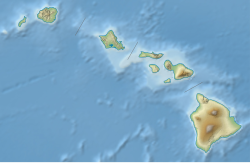Aloha Jewish Chapel
| Aloha Jewish Chapel | |
|---|---|
 Interior of Aloha Jewish Chapel | |
| Religion | |
| Affiliation | Judaism |
| Rite | Unaffiliated |
| Ecclesiastical or organisational status | Synagogue |
| Status | Active |
| Location | |
| Location | Pearl Harbor Naval Station (Makalapa Gate), Honolulu, Hawaii |
| Country | United States |
Location in Hawaii | |
| Geographic coordinates | 21°21′11″N 157°56′10″W / 21.35306°N 157.93611°W |
| Architecture | |
| Architect(s) | Vladimir Ossipoff |
| Type | Synagogue |
| Date established | 1975 |
Aloha Jewish Chapel is an unaffiliated Jewish synagogue located on the grounds of what is now Joint Base Pearl Harbor–Hickam in Honolulu, Hawaii, in the United States.
History[edit]
Completed in 1975, the building was designed by Vladimir Ossipoff[1] as the first building built by the United States government exclusively for Jewish worship.[2] (The Commodore Levy Chapel, Naval Station Norfolk, is the Navy's oldest Jewish Chapel, but it is part of a larger Chapel complex.) The Aloha Jewish Chapel was dedicated on December 14, 1975 by Rear Admiral Bertram Wallace Korn, who was, at the time, the highest ranking rabbi in the United States military.[3]
The chapel has a vaulted roof with an adjacent mikveh (ritual bath). The building also contains a kitchen for kosher food, a library, and a small social hall.[4] On the exterior of the building is the "Shalom" sculpture created in 1975 by Selma Mannheim of Los Angeles, California. With its copious natural light, the building is considered a prime example of Hawaii Modern architecture.[5][6]
The congregation raised money for, and purchased, a new Torah scroll, which was dedicated on October 26, 2008. This was the first dedication of a new Torah scroll in Hawaii.
Gallery[edit]
-
Sefer Torah dedication in 2008
References[edit]
- ^ Sakamoto, Dean; Britton, Karla; Murphy, Diana, eds. (2007). Hawaiian Modern: The Architecture of Vladimir Ossipoff. et al. New Haven, CT, USA: Honolulu Academy of Arts and Yale University Press. p. 265. ISBN 978-0-300-12146-9. OCLC 488550784.
- ^ Tigay, Alan M. (January 2009). "The Jewish Traveler: Honolulu". Hadassah Magazine. 90 (5). Hadassah: 28. ISSN 0017-6516. OCLC 610586821. Archived from the original on August 27, 2011. Retrieved April 13, 2013.
- ^ Tong, David (December 13, 1975). "Rabbi calls Zionism vote "propaganda"". Honolulu Star Bulletin. p. A13.
- ^ Historic American Buildings Survey No. HI-568, pp. 2-4
- ^ Sakamoto, Dean; Britton, Karla; Murphy, Diana, eds. (2007). Hawaiian Modern: The Architecture of Vladimir Ossipoff. et al. New Haven, CT, USA: Honolulu Academy of Arts and Yale University Press. p. 265. ISBN 978-0-300-12146-9. OCLC 488550784.
- ^ Historic American Buildings Survey No. HI-568
External links[edit]
- 1975 establishments in Hawaii
- 20th-century synagogues in the United States
- Jewish-American military history
- Jewish organizations established in 1975
- Military chapels of the United States
- Military facilities in Hawaii
- Religious buildings and structures in Honolulu
- Synagogues completed in 1975
- Synagogues in Hawaii
- Unaffiliated synagogues in the United States
- United States synagogue stubs
- Hawaii building and structure stubs
- Honolulu stubs


